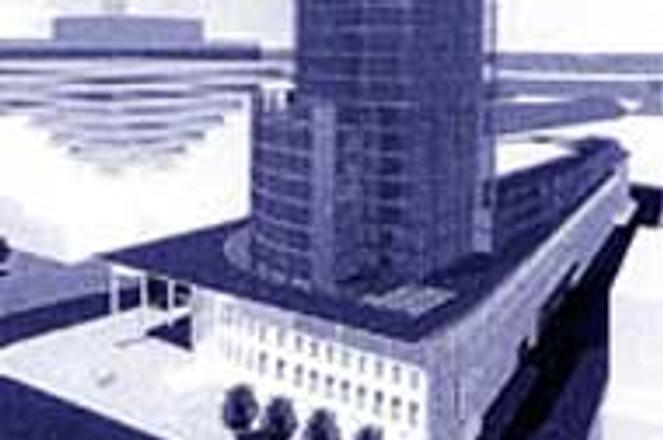The new NBS headquarters - 37 storeys, 111 meters high, 56,492 square meters of office space - will cost over 3.5 billion crowns.photo: Computer visualisation by architects Martin Kusý and Pavol Pančák
While Slovakia struggles through a deepening economic crisis, and while the cabinet wrestles with austerity measures, the National Bank of Slovakia (NBS) is erecting an expensive new headquarters in Bratislava that will eventually be the nation's tallest building.
As the projected July 2000 completion date approaches, the project has drawn increasingly harsh criticism from government officials who are being forced to pinch pennies in their own departments. On the other side of the fence stand bank officers and Bratislava city hall, who defend the building as a necessity for the NBS, a help to the city and ultimately a money-saver.
"As a representative of the municipality, I can say that the sale was crucial for the city to even survive the 1990's in terms of operating municipal systems for the citizens," said Milan Vajda, the press secretary of former Bratislava Mayor Peter Kresánek (1990-1998) and currently spokesperson for the Old Town district. "From the city's perspective, we are very happy that they are building it because right now they are the only customers who can afford to buy property from the city."
Ground was broken for the projected 37-floor NBS building on June 16, 1993. The structure will house 1,100 NBS employees and cost, according to bank spokesman Ján Onda, 3.5 billion Slovak crowns (Sk - $87.5 million).
Onda explained that the building is "completely logical" for the bank. "Our current headquarters on Štúrova Street [in downtown Bratislava] is a former branch office for the State Bank of Czechoslovakia. A branch office doesn't allow for the proper functioning of a state bank. We need a big, centralised location."
Onda explained that the NBS currently occupies ten buildings in Bratislava and has to pay upwards of 100 million Sk in annual rent. "The new building will be here for 100 years, so from that point of view, the NBS will probably end up saving money," he said.
Adriana Litomerická, the director of real estate agency Národna Aukčná Spoločnost, agrees that the building's construction is logical. "From the point of view of a large company, it is much better to have one centralised building rather than five or six smaller ones," she said. "The building will be advantageous for the NBS from that perspective."
Too expensive
But critics of the project are legion. Finance Minister Brigita Schmögnerová is among those who say the massive new building is a waste of state money and too grandiose by half. "The main reason I don't like it is the cost," she said. "They say that the building will be one of the four or five biggest in all of Europe. I just don't think that Slovakia is so important that we need such an elaborate building."
"The cost will not be 3.5 billion Sk like the NBS says," Schmögnerová continued. "It will actually end up costing five billion Sk."
Litomerická agreed, saying "usually, the initial price projections for big projects are not so accurate. So it could be closer to 5 billion Sk than 3.5 billion Sk."
Even Old Town's Vajda said he could imagine how the project might provoke public anger. "Looking through the eyes of the average citizen," he said, "I can understand how they might look at the construction and say, 'Is this my money that they are using to build their wonderful steel and glass skyscraper?' However, it is important to realise that the city is not paying for the building. The NBS is."
Schmögnerová said that as much as she disliked the project, her powers as Finance Minister did not allow her to prevent the NBS from building what it wants. However, she warned that in future, the NBS may not be given such a free hand to make budgetary decisions involving such large amounts of money. "It is clear to me that parliament must take a more active role in the future budgeting of the NBS," she said.
Onda, for his part, said that decisions on the bank's administrative budget will continue to be made by NBS officials. "The decision to construct the building was made by the bank's council," he said. "They are the only people responsible for making such a decision."
"Every year, we submit our yearly budget [to parliament]," Onda added. "And parliament has approved our yearly budget [each year], so I don't understand why they are complaining."
Litomerická sounded a final note of cautious optimism. "We should be proud of the building, it's good for the city," she said. "Perhaps they spent too much on it, but it's still exciting for Bratislava."
Additional reporting by
Soňa Bellušová


